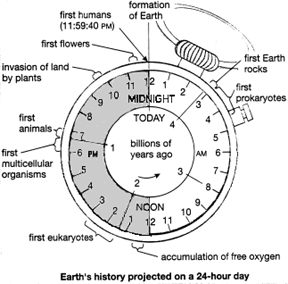Was the Evolution of Life as we Know it Inevitable?If variation is ubiquitous, and the variants that survive and reproduce best in a given environment come to dominate populations in an inevitable process, then wouldn't evolution proceed the same way again if it started all over? Did the process of evolution lead inexorably to life as we know it? I will argue that the answer is "no", that although the process of evolution always works in the same way, the outcome is highly contingent on a complex array of factors. First, "life as we know it" is only a small slice of life on Earth. Most of us spend our days noticing only a few types of organisms - mammals (our families and pets), maybe other vertebrates (birds, fish), flowering plants (nearly everything in our yards except conifers), and perhaps fungi or "lower" plants like moss and algae if we look hard. But fungi, plants and animals are just the tips of the top branches on the tree of life, and even within these huge groups of organisms, only one species is usually considered as "intelligent life". As mentioned before, most species on Earth have not yet been discovered or named by scientists - we may know most of the vertebrates, but in other groups, there are still many types of organisms that remain unknown to science. Of those organisms that have been named (about 1,413,000 species) most are insects (> 50%, Fig, 1). About 20% are flowering plants and conifers, while mammals (which are grouped into "other animals" in Figure 1) number only 4000 species. The animal phylum in which vertebrates are found (Phylum Chordata) was the last animal phylum to diversify, and within this, the evolutionary path to mammals, and then on to primates (monkeys and chimps) and finally to humans has been a complex one. At many points, the outcome of evolution could have been different had even a small aspect of the complex environment of life been different. The evolutionary process is highly contingent. Natural selection modifies what is already present, given the genetic variation that is available, to promote traits that are favorable in the current environment. Evolution by natural selection is also opportunistic. Natural selection favors the best characteristics that are available. It does not lead to adaptation to future environments, nor preserve adaptations to past environments if such traits are no longer advantageous. Life could not have (and didn't) begin with complex organisms such as mammals, because life began as simple self-replicating molecules from which complexity evolved through an ongoing process of descent with modification. The time course of the evolutionary path of life on Earth can be visualized as a 24-hour clock (figure 4 below). The evolution of life on Earth has been proceeding for 3.9 billion years, since the appearance of the first prokaryotes (single cells with no nucleus, such as bacteria). The immensity of time that passed between the evolution of these first life forms and the first multicellular organisms (2.8 billion years) is hard to fully grasp. For about the first 3.6 billion years of life, all living things occupied the oceans. The land was nothing but bare rock for all this time. Only 500-440 million years ago did organisms begin to colonize land. The clock metaphor makes the brevity of the existence of "intelligent" life on earth particularly obvious. If the Earth was formed in the first seconds of the "day", the first humans did not appear until 11:59:40 in the history of Earth - just a few seconds before the present (about 100,000 years ago).
Figure 4. Earth's history depicted on a 24 hour clock.From Audesirk/Audesirk, BIOLOGY: Life On Earth, 5/e, © 1999. Electronically reproduced by permission of Pearson Education, Inc., Upper Saddle River, New Jersey. Figure 22-1, Table 17-1. Consider the impact of this evolutionary time scale on the likelihood that intelligent life would be found by an alien searching for life on our planet. Clearly, for most of Earth's history the only forms of life to have been found would be prokaryotes in the ocean (Domains Bacteria and Archaea). A time traveler that happened upon our world within the most recent "hours" of its existence (about the past 400 million years) might have been able to see simple land plants, amphibians and reptiles. Mammals only began to proliferate after the extinction of the dinosaurs 65 million years ago. It would have to be a lucky time traveler indeed that happened upon our world during the "20 seconds" of its day that it has been occupied by humans. If "intelligent" life has evolved in other worlds, one could expect that the same immense amount of time may have elapsed there before its appearance. What is the chance that during the brief existence of intelligent life on two worlds, they would find one another? It seems much more likely that if we were to find life on other worlds, that it would be some life form that were present during the bulk of the long time course of evolution, such as a prokaryote (see also the next chapter in this volume).
Contributed by: Dr. Sara Via |






